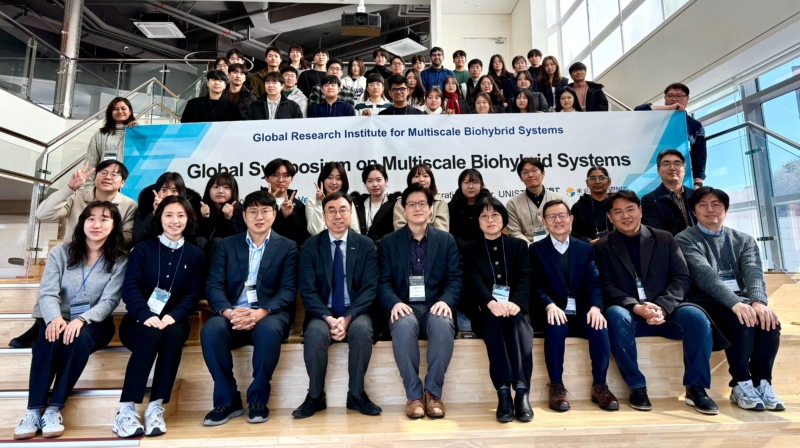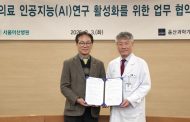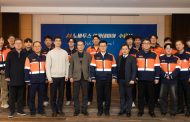As individuals age, muscle regeneration becomes increasingly critical for maintaining health and quality of life. To address this challenge, there is a pressing need for advanced biotechnological solutions. In response, UNIST has established a global bio institute focused on muscle regeneration and the broader challenges of aging.
The Department of Biomedical Engineering at UNIST hosted the 2025 Global Symposium on Multiscale Biohybrid Systems at the Industry-Academia Collaboration Center at UNIST from February 9 to 10, 2025. This event commemorated the establishment of the Advanced Bio Global Joint Research Center, supported by the Ministry of Science and ICT, and showcased the achievements of the ‘UNIST Global Research Institute for Multiscale Biohybrid Systems (GRIMBS).’
GRIMBS is dedicated to developing bio-hybrid systems that accurately simulate biological tissue structures and restore human functionality. This groundbreaking technology holds potential for enhancing quality of life by promoting muscle regeneration and restoring function in the elderly.
The symposium welcomed over 80 researchers from the University of Tokyo and the National University of Singapore. The first day featured the 2025 GRIMBS Rising Star Symposium, where Dr. Hyunmo Yang from UNIST presented innovative biomedical image analysis technology based on deep learning. Tomohiro Morita from the University of Tokyo showcased a bio-hybrid robot powered by electrical stimulation, while Dr. Nishanth Venugopal Menon from the National University of Singapore introduced a system for culturing intestinal microorganisms and epithelial cells.
On the second day, esteemed scholars delivered keynote lectures where Professor Chwee Teck Lim from the National University of Singapore analyzed the principles of cell migration and explored their applications in bio-hybrid design. The iHealthtech Institute from the National University of Singapore highlighted its successful commercialization efforts in diverse areas, including AI healthcare, the metaverse, and disease diagnosis, attracting $59 million in investment and generating over 65 jobs through six startups. Professor Shoji Takeuchi from the University of Tokyo emphasized the applicability of muscle tissue in robotics.
UNIST researchers presented remarkable achievements spanning molecules to tissues. Professor Yoon-Kyoung Cho from UNIST developed a “multi-scale lab-on-a-chip system” for analyzing tumor spheroids, providing insights into overcoming resistance to anticancer drugs. Professor Jinmyoung Joo from UNIST introduced nanoparticles for translational and precision medicine. Additionally, Professor Jongho Park from the University of Tokyo unveiled a fine needle patch capable of detecting biological signals in real time.
Significant research findings were also shared in the domains of tissue regeneration and precision medicine. Professor Hyun-wook Kang from UNIST proposed the potential for treating ischemic diseases using advanced 3D bioprinting technology to precisely control the orientation of blood vessels. Professor Woonggyu Jung from UNIST revealed optical imaging technology that analyzes tissues without the need for chemical staining, while Professor Youngbin Tchoe from UNIST presented real-time brain mapping technology aimed at improving the accuracy of brain surgery. Furthermore, Professor Byung Soo Kim from Pusan National University discussed technology to create complex living tissues through 3D bioprinting.
During the poster session, more than 20 research results were shared, prompting active discussions among attendees. “The launch of GRIMBS marks a pivotal moment for UNIST in leading biomedical innovation,” stated Vice President Sung ChulBae of Academic Affairs at UNIST. “We aim to collaborate with world-class research institutions such as the LIMMS at the University of Tokyo and iHealthtech at the National University of Singapore to address challenges in the biotechnology sector.”
Dean Yoon-Kyoung Cho of the College of Information and Biotechnology at UNIST remarked, “GRIMBS will spearhead innovation in precision medicine through research that spans from molecules to organizations. We also intend to expand international exchange programs to nurture a new generation of research talent.”
Moving forward, GRIMBS plans to intensify its research on bio-hybrid systems and establish itself as a global research hub by operating international joint research and talent development programs.









![[2026 Matriculation] UNIST Welcomes Class of 2030!](https://news.unist.ac.kr/wp-content/uploads/2026/02/사진-박종래-UNIST-총장이-2026년-입학식사를-전하고-있다-2-190x122.jpg)
![[2026 UNIST Commencement] UNIST Confers Degrees to 883 Graduates](https://news.unist.ac.kr/wp-content/uploads/2026/02/사진-2026학년도-UNIST-졸업생들이-학사모를-위로-던지며-졸업을-축하하고-있다-1-800x413-190x122.jpg)



